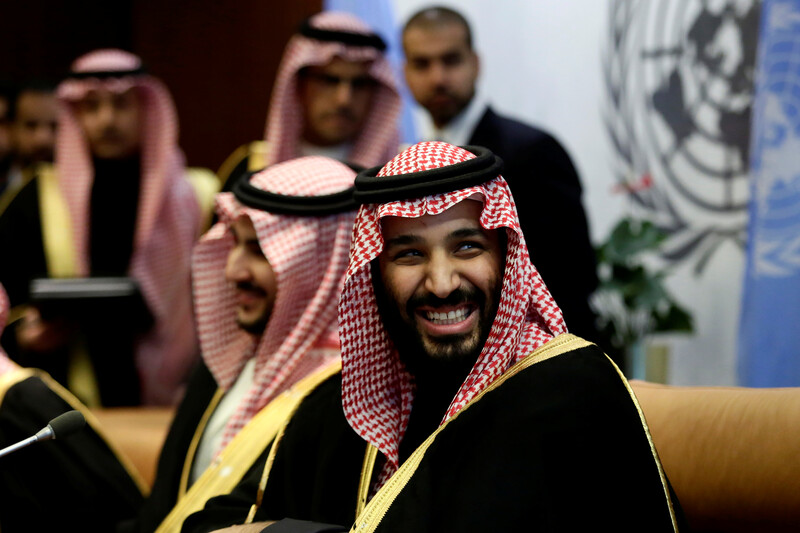Power Suits 10 April 2018

Mohammad bin Salman at the United Nations headquarters in New York City on 27 March.
ReutersIt was no innocuous remark. It was also not all it was made out to be.
Saudi Crown Prince Mohammad bin Salman’s recently, and apparently successfully, concluded tour de charm to the US included a number of interviews with American media, including one in The Atlantic that caused some reverberations.
It was a remarkable interview in many ways, not least for the way in which MBS, as he is now almost universally known, is described as having “made all the right enemies” – Hamas, Iran and Hizballah along with Islamic State and al-Qaida – and for, “like many Arab leaders, [having] tired of the Palestinians.”
While that may simply have been projection by the author, MBS was certainly outspoken about his views on the Middle East, at times sounding like his talking points had been drafted by some junior at a K-Street PR company.
Thus, undoubtedly, the “triangle of evil” was born (to describe Iran, the Muslim Brotherhood and groups like al-Qaida and Islamic State), an expression so trite it didn’t even make the headline or subheading in The Atlantic itself.
Thus, too, we learn that in the Middle East, “you don’t have good decisions and bad decisions. Sometimes you have bad decisions and worse decisions.”
And then to compound matters, MBS – otherwise keen to present himself as a Silicon Valley leader with his finger on the tech pulse – said Iranian supreme leader Ayatollah Ali Khamenei made “Hitler look good” (by wanting to conquer the world, not just Europe), ignoring the golden rule of online debating: the first person to mention the Nazis loses the argument.
On the rights of peoples
Yet his answer to the question of whether he believed “the Jewish people have a right to a nation-state in at least part of their ancestral homeland” (a wonderfully loaded question) was not quite as radical as it was made to appear.
His answer was seized upon by some as groundbreaking. He did what “no Arab leader has ever acknowledged,” The Atlantic breathlessly reported: he “recognizes the right of the Jewish people to have a nation-state of their own next to a Palestinian state.”
But, weary as he may or may not be with the Palestinians, and unlike the bluntness with which he addresses other issues, MBS’ answer here was fairly conservative. “I believe,” he said, “that each people, anywhere, has a right to live in their peaceful nation. I believe the Palestinians and the Israelis have the right to have their own land.”
As published, this answer – one part standard universal rights language, one part restatement – offers Israel no more and no less than Saudi Arabia did with its 2002 two-state peace initiative. Indeed, MBS added that “we have to have a peace agreement to assure the stability for everyone and to have normal relations.”
So why the brouhaha?
In part of course this suits Riyadh. Clearly obsessed with Tehran, the young Saudi prince is setting the stage for a confrontation of uncertain nature. Washington is the crucial ally in any such showdown and saying something vaguely nice about Israel – a well-trodden PR strategy in Arab capitals – always plays well in America, not least due to Israel’s many cheerleaders in the US media.
In addition, the remarks must be seen in the broader context of how MBS says he sees the region. Risible as it may seem, if you believe that the Iranian revolution in 1979 was the first step in a deliberate campaign by an Iranian theocracy to take over the world and see the emergence of the hidden Imam, then the past 15 years will have been particularly worrying.
A map of perceived woes
All you need is a map of the region. Since the invasion of Iraq in 2003, warnings of a Shia crescent hanging over the Arab world like a scimitar, would seem to have come dramatically true. From Lebanon, through Syria and Iraq, all the way over to the Afghan border in the east, Iran’s sphere of influence would seem to have amputated the Arabian peninsula from the rest of the world.
Indeed, if you include Yemen, where Saudi Arabia launched a deadly military intervention in 2015 in defense, it says, of a legitimate government under threat from Iran’s proxies there, Iran is trying to surround Arab countries.
Never mind that it was the US that invaded Iraq and created a vacuum there for the country’s majority Shia population to step into to then deepen relations with Iran. Never mind that Syria’s conflict, which has seen Iran establish a significant military presence in the country, was inspired by uprisings across the Arab world, including in Yemen, against autocratic leaders.
To some, evidently including MBS, this is confirmation that Tehran’s nefarious plans to see the return of the hidden Imam are coming to fruition.
And in this conflict, Israel and Saudi Arabia have a common enemy in Iran, as MBS readily admits. But he has also been clear that “we cannot have a relation with Israel before solving the peace issue.”
Israeli impunity
How that “peace issue” is to be solved and what Riyadh will support in this context is a different matter. There have by now been several reports about an imminent US administration plan for sealing what President Donald Trump has called the “deal of the century.”
But beyond calamitously acceding to Israel on Jerusalem – a most unpropitious start – there has been nothing.
Officially, Riyadh has rejected Trump’s Jerusalem announcement. Unofficially, rumors to the contrary abound. But Trump and MBS will find that however much pressure they apply to Palestinians, there is only so much any Palestinian leader, whether from Fatah or Hamas or anywhere else, can accept.
This is about more than settling for a less than optimal deal. “Reality,” as Trump seems to have mistaken political expediency for, is no substitute for the kind of peace agreement that addresses the core elements of a conflict – the reasons there is conflict – in a way that doesn’t simply let the powerful take what they want.
Justice is a much-maligned concept, but trying to divorce it from any solution to the conflict is a fool’s errand. A sense of injustice is what drives Palestinians to protest their right of return even at the risk of death and in the knowledge that Israeli soldiers operate a shoot-to-kill policy that they apparently enjoy quite a bit.
Israel has always acted with impunity, regardless of Riyadh. But a seemingly pliant crown prince with a similar regional agenda will only encourage Tel Aviv. If Saudi Arabia wants to offer Israel a carrot, it needs to find a stick too.
Otherwise – as successive US administrations have discovered, having been maneuvered into trying to curb Israel’s settlement building and land snatching by offering more and bigger loans, aid and arms deals over the years in an unusual “carrot and bigger carrot” tactic – relations will go only one-way.




